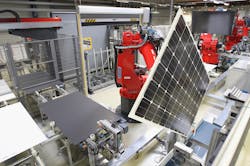Solar Company Says China's Cyber-Espionage Causes Trade Struggles
SolarWorld Industries America Inc. said on June 26 that it was heartened that a criminal indictment against five members of a Chinese military unit has raised awareness about China’s systematic, state-planned retaliation against targeted U.S. industries.
According to the recent indictment, which was unsealed last month, four out of six U.S. organizations that were targeted by People’s Liberation Army cyber-espionage attacks had filed trade cases against state-sponsored industries of China.
The U.S. victims that allegedly were targeted in computer-based spying included SolarWorld Industries America Inc., U.S. Steel, the United Steelworkers union and Allegheny Technology Inc., among others.
In the instance of SolarWorld, the indictment alleges that corporate secrets allegedly stolen in mid-2012 included proprietary information in documents which the company was preparing to submit in ongoing trade cases against the state-controlled Chinese solar industry. In such cases, companies submit proprietary information to the U.S. government that only attorneys for the parties are allowed to review. The companies and the Chinese government are prohibited from reviewing the confidential business information of the opposing parties. Violations of this protective order carry heavy civil penalties for anyone involved.
In allegedly capturing trade-case documents – along with financial and technological secrets – from SolarWorld, the company said, the Chinese government secured a dual unfair advantage in attempting to thwart the company. The cyber-espionage allegations, if true, confirm China’s pattern of retaliating against companies and industries that bring legal cases to challenge unfair Chinese trading practices such as dumping and subsidies, SolarWold said.
Despite the alleged cyber-hacking by China, Commerce and the U.S. International Trade Commission affirmed SolarWorld’s factual assertions and imposed duties averaging 31% to offset the improper effects of the Chinese industry’s trade practices in late 2012. Chinese producers, however, seized a loophole in the remedy – by using a third country to carry out one of four stages of solar-panel production – to evade import duties, according to SolarWorld.
As a result, the company brought a second, current set of cases on behalf of the domestic industry, which the company said has unfairly suffered numerous factory shutdowns and thousands of manufacturing job losses as a result of China’s improper trade practices. Once again, these cases allege that China’s state-sponsored trade drive is unfairly eliminating competition and seizing U.S. market share by using improper, export-intensive industrial subsidies and artificially low prices below production costs. The U.S. National Renewable Energy Laboratory has concluded that Chinese producers do not have a production cost advantage on solar products.
About the Author

Adrienne Selko
Senior Editor - MH&L, IW, & EHS Today
Adrienne Selko has written about many topics over the 17 years she has been with Endeavor Business Media and currently focuses on workforce development strategies. Previously Adrienne was in corporate communications at a medical manufacturing company as well as a large regional bank.
She is the author of Do I Have to Wear Garlic Around My Neck? which made the Cleveland Plain Dealer's best sellers list. She is a senior editor at Material Handling & Logistics, EHS Today, and IndustryWeek.
Editorial Mission Statement:
Manufacturing is the enviable position of creating products, processes, and policies that solve the world’s problems. When the industry stepped up to manufacture what was necessary to combat the pandemic, it revealed its true nature. My goal is to showcase the sector’s ability to address a broad range of workforce issues including technology, training, diversity & inclusion, with a goal of enticing future generations to join this amazing sector.
Why I Find Manufacturing Interesting:
On my first day working for a company that made medical equipment such as MRIs, I toured the plant floor. On every wall was a photo of a person, mostly children. I asked my supervisor why this was the case and he said that the work we do at this company has saved these people’s lives. “We never forget how important our work is and everyone’s contribution to that.” From that moment on I was hooked on manufacturing.
I have talked with many people in this field who have transformed their own career development to assist others. For example, companies are hiring those with disabilities, those previously incarcerated, and other talent pools that have been underutilized. I have talked with leaders who have brought out the best in their workforce, as well as employees doing their best work while doing good for the world.
